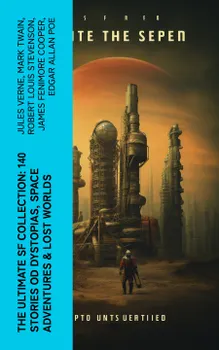Enjoy this meticulously edited SF Collection, jam-packed with space adventures, dystopian apocalyptic tales and the greatest sci-fi classics: H. G. Wells: The Time Machine The War of the Worlds The Island of Doctor Moreau The Invisible Man… Jules Verne: Journey to the Center of the Earth 20.000 Leagues under the Sea The Mysterious Island… Mary Shelley: Frankenstein The Last Man Edgar Wallace: Planetoid 127 The Green Rust… Otis Adelbert Kline: The Venus Trilogy The Mars Series Malcolm Jameson: Captain Bullard Series Garrett P. Serviss: Edison's Conquest of Mars A Columbus of Space The Sky Pirate… Arthur Conan Doyle: The Professor Challenger Series Francis Bacon: New Atlantis Edwin A. Abbott: Flatland Jack London: Iron Heel The Scarlet Plague The Star Rover… Robert Louis Stevenson: Dr Jekyll and Mr Hyde George MacDonald: Lilith H. Rider Haggard: King Solomon's Mines She William H. Hodgson: The House on the Borderland The Night Land… Edgar Allan Poe: Some Words with a Mummy Mellonta Tauta… H. P. Lovecraft: Beyond the Wall of Sleep The Cats of Ulthar Celephaïs Edward Bellamy: Looking Backward: 2000–1887 Equality… Mark Twain: A Connecticut Yankee in King Arthur's Court Owen Gregory: Meccania the Super-State Margaret Cavendish: The Blazing World Jonathan Swift: Gulliver's Travels William Morris: News from Nowhere Samuel Butler: Erewhon Edward Bulwer-Lytton: The Coming Race James Fenimore Cooper: The Monikins Hugh Benson: Lord of the World Fred M. White: The Doom of London Ignatius Donnelly: Caesar's Column Ernest Bramah: The Secret of the League Arthur D. Vinton: Looking Further Backward Robert Cromie: The Crack of Doom Anthony Trollope: The Fixed Period Cleveland Moffett: The Conquest of America Richard Jefferies: After London Francis Stevens: The Heads of Cerberus Percy Greg: Across the Zodiac David Lindsay: A Voyage to Arcturus Stanley G. Weinbaum: Stories from the Solar System Edward Everett Hale: The Brick Moon Abraham Merritt: The Moon Pool The Metal Monster… C. J. Cutcliffe Hyne: The Lost Continent Lewis Grassic Gibbon: Three Go Back
The Ultimate SF Collection: 140 Stories od Dystopias, Space Adventures & Lost Worlds
Auteurs:
- Jules Verne
- Mark Twain
- Robert Louis Stevenson
- James Fenimore Cooper
- Edgar Allan Poe
- William Hope Hodgson
- George MacDonald
- Percy Greg
- Jack London
- Arthur Conan Doyle
- Ernest Bramah
- Jonathan Swift
- Cleveland Moffett
- William Morris
- Anthony Trollope
- Richard Jefferies
- Samuel Butler
- David Lindsay
- Edward Everett Hale
- Edward Bellamy
- Charlotte Perkins Gilman
- Edgar Wallace
- Francis Bacon
- Robert Cromie
- Abraham Merritt
- Ignatius Donnelly
- Owen Gregory
- H.G. Wells
- Stanley G. Weinbaum
- Fred M. White
- H.P. Lovecraft
- Garrett P. Serviss
- Henry Rider Haggard
- Mary Shelley
- Malcolm Jameson
- Edward Bulwer-Lytton
- Lewis Grassic Gibbon
- Otis Adelbert Kline
- C.J. Hyne
- Edwin A. Abbott
- Arthur Dudley Vinton
- Gertrude Barrows Bennett
- Hugh Benson
- Margaret Cavendish
Formaat:
Duurtijd:
- 13095 bladzijden
Taal:
Engels
Categorieën:

12 Classic Books You Need to Read Before You Grow up
Antoine de Saint Exupery, Lewis Carroll, Robert Louis Stevenson, Frances Hodgson Burnett, Mark Twain, Eleanor H. Porter, Jules Verne, Charles Dickens, Jack London, Lyman Frank Baum, Margery Williams, J.M. Barrie
audiobookbook
De reis om de wereld in 80 dagen
Jules Verne
audiobookbook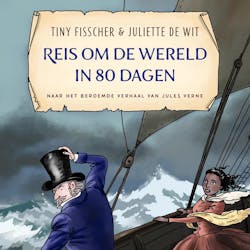
Reis om de wereld in 80 dagen
Tiny Fisscher, Jules Verne
audiobook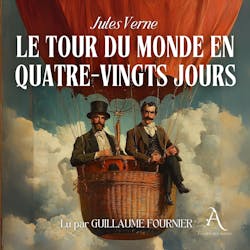
Le Tour du monde en quatre-vingts jours - Livre Audio
Jules Verne, Livres audio en français
audiobook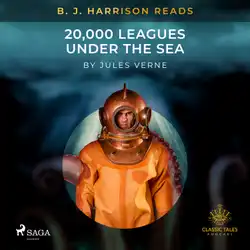
B. J. Harrison Reads 20,000 Leagues Under the Sea
Jules Verne
audiobook
In Search of the Castaways - Audiobook
Jules Verne, Classic Audiobooks
audiobook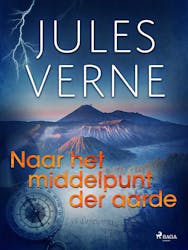
Naar het middelpunt der aarde
Jules Verne
book
Journey to the Center of the Earth - Audiobook
Jules Verne, Classic Audiobooks
audiobook
The Adventures of Captain Hatteras
Jules Verne
audiobookbook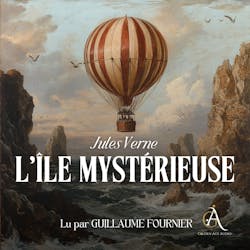
L'Île mystérieuse - Livre Audio
Jules Verne, Livres audio en français
audiobook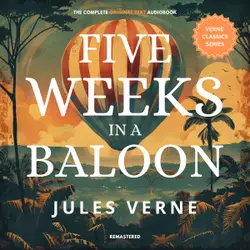
Five Weeks in a Balloon : The original text - Remastered
Jules Verne
audiobook
Naar het Middelpunt der Aarde
Jules Verne
audiobook
- 1366 boeken
Jules Verne
Jules Verne (1828-1905) was een Franse schrijver en pionier in het sciencefictiongenre. Zijn boek Cinq semaines en ballon (Vijf weken in een ballon) betekende in 1863 zijn doorbraak, en werd in verschillende talen gepubliceerd. Vanaf dat moment werden er jaarlijks twee of meer boekdelen van zijn hand gepubliceerd. Verne is vooral bekend als de schrijver die "de toekomst voorspelde". Hij beschreef in zijn boeken veel zaken die destijds als fantasie werden beschouwd, maar later in een indrukwekkend aantal gevallen werkelijkheid werden. Hij voorzag een reis naar de maan die iets meer dan 100 jaar later voor het eerst gerealiseerd werd tijdens het Apollo-programma. Maar er zijn ook essentiële verschillen tussen dit boek en de ruimtevaart aan te wijzen. Zo worden de maanreizigers van Jules Verne afgeschoten met behulp van een reusachtig kanon en niet gelanceerd met een raket. De maanreizigers landden ook niet op de maan, maar vlogen er omheen om vervolgens terug te keren, iets wat later ook in het Apollo-programma zou gebeuren met Apollo 8 (1968, gepland) en Apollo 13 (1970, ongepland, na een ontploffing aan boord). Noemenswaardig is dat de plaats van lancering ook op Cape Canaveral was en de plaats waar Apollo 11 neerkwam op aarde maar enkele kilometers verschilde met de kogel uit het boek van Verne. Verder voorzag hij onder andere de langeafstandsreizen in luchtballonnen en de tochten van onderzeeboten onder het poolijs. Zijn gave om deze voorspellingen te doen berustte echter niet alleen op fantasie. Hij was zeer intelligent, was zeer goed op de hoogte van de technische ontwikkelingen van zijn tijd, deed degelijk onderzoek en paste wetenschappelijke logica toe.
Lees meer - 1272 boeken
Mark Twain
Mark Twain is de schrijversnaam van Samuel Clemens (1835–1910). Hij werkte als schrijver, humorist, ondernemer en uitgever. Hij wordt wel de 'vader van de Amerikaanse literatuur' genoemd. Bekend romans van zijn hand zijn De avonturen van Tom Sawyer en De avonturen van Huckleberry Finn.
Lees meer - 1643 boeken
Edgar Allan Poe
Edgar Allan Poe (1809–1849) was een Amerikaans schrijver en dichter. Hij werkte ook als literair criticus en redacteur. Hij werd geboren in Boston, Massachusetts, als zoon van reizende acteurs, Eliza Poe en David Poe, Jr., die beiden overleden voor hij drie jaar oud was. Poe werd in huis genomen door John Allan, een succesvol zakenman uit Richmond, Virginia. Hij werd niet officieel geadopteerd en nam Allan als z’n tweede voornaam. Van 1815 tot 1820 werd hij (gedeeltelijk) opgeleid in Engeland. In 1826 schreef hij zich in aan de University of Virginia, maar bleef daar slechts een jaar. Hij begon te drinken, te gokken, kon zijn vele schulden niet meer betalen en werd weggestuurd. In 1827 liep Poe weg bij de Allans en ging hij bij het leger. Later werd hij ontslagen wegens opzettelijk plichtverzuim. Zo ging hij bij zijn grootmoeder (langs vaders kant), zijn tante, Mrs Maria Clemm, en zijn nichtje, Virginia Clemm, wonen in Baltimore, Maryland. In 1836 trouwde hij met Virginia, die op dat ogenblik 13 jaar oud was. Hij begon te werken als redacteur en literair criticus. Hij schreef ook verhalen en gedichten, maar met matig succes. Pas met de publicatie van zijn gedicht The Raven in 1845 begon hij literaire erkenning te krijgen. In 1847 overleed Virginia aan tuberculose. Na haar dood begon Poe de strijd tegen drank en drugs te verliezen, in 1848 probeerde hij zelfmoord te plegen. In het daaropvolgende jaar verdween hij gedurende drie dagen en vond men hem ergens in de goot in de straten van Baltimore in ijlende toestand terug. Enkele dagen later overleed hij. Poe was nooit meer lang genoeg bij bewustzijn om uit te leggen hoe hij in die erbarmelijke toestand terecht was gekomen en hoe het kwam dat hij niet z’n eigen kleren droeg. Volgens onderzoek van de Amerikaanse auteur Matthew Pearl zou Poe overleden zijn aan de gevolgen van een hersentumor. Pearl schreef eerder The Poe Shadow, waarin hij in de vorm van een historische detectiveroman de dood van Edgar Poe beschreef. Poe's bijzondere en vaak nachtmerrie-achtige werk was van grote invloed op de verschillende horror- en fantasy-genres. Hij wordt ook gezien als de grondlegger van het detective-genre met zijn drie verhalen over Auguste Dupin. Deze hadden een grote invloed op veel mysterie-schrijvers na hem, onder meer Arthur Conan Doyle in The Hound of the Baskervilles. Zijn literaire reputatie was buiten de VS groter dan in de VS zelf, waarschijnlijk omdat het macabere karakter de bevolking daar niet aansprak. Rufus Griswold werd zijn agent, maar was ook een rivaal en een vijand. Griswold had namelijk Memoires van de schrijver uitgebracht, waarin Poe werd afgeschilderd als een dronkaard en een opiumverslaafde. Mede hierdoor was Poe niet erg populair in Amerikaanse literaire kringen. In Frankrijk, waar hij over het algemeen bekend staat als "Edgar Poe", werden zijn verhalen en enkele van zijn gedichten vertaald door Charles Baudelaire. Zijn goede vertalingen leidden ertoe dat Poe populair werd onder de avant-garde schrijvers in Frankrijk. Schrijvers als Algernon Charles Swinburne werden sterk beïnvloed door zijn werk. Poe werd ook gewaardeerd door de Symbolisten, en Stephane Mallarmé droeg verschillende gedichten aan hem op. Naast de literaire en poëtische kant had Poe ook interesse in filosofische en wetenschappelijke vraagstukken. Dit laatste komt het best naar voren in zijn in 1848 geschreven Eureka, een essay over het materiële en spirituele universum (bron: Wikipedia).
Lees meer - 2231 boeken
Arthur Conan Doyle
Arthur Conan Doyle (1859-1930) was arts, maar werd vooral bekend als schrijver. Zijn verhalen over de intelligente, enigszins verwaande detective Sherlock Holmes, immer bijgestaan door zijn trouwe vriend Dr. Watson, zijn al tientallen jaren populair. Naast detectives schreef Doyle ook historische romans, toneelstukken, poëzie en non-fictie. Toch waardeerde het grote publiek hem vooral om zijn detectives.
Lees meer - 205 boeken
Jonathan Swift
Jonathan Swift (1667-1745) was een Iers prozaschrijver, dichter, pamflettist en satiricus. Hij werd geboren in Dublin, waar hij ook opgroeide. Hij ging later werken in Engeland. Na zijn terugkeer in Ierland werkte hij als geestelijke. Swifts bekendste werk is Gulliver's Travels (1726). Delen van het boek werden uitgebracht als kinderboek, maar het is ook een felle en geestige satire waarin hij ageert tegen politieke en sociale wantoestanden.
Lees meer - 875 boeken
Edgar Wallace
Edgar Wallace (1875–1932) was een Engelse journalist en schrijver van misdaadthrillers en toneelstukken. Zijn ouders waren acteurs. Vlak na zijn geboorte werd hij geadopteerd door een visboer uit Londen. Hij begon zijn schrijverscarrière als oorlogscorrespondent in Zuid-Afrika voor de Londense krant de Daily Mail gedurende de Tweede Boerenoorlog. Daarna legde hij zich toe op misdaadverhalen: hij zou in totaal 175 boeken schrijven, naast 24 toneelstukken en een grote hoeveelheid journalistiek werk. Wallace wordt gezien als 'uitvinder' van de moderne thriller. Zijn helden zijn over het algemeen politiemensen en geen amateur-detectives zoals toen gebruikelijk. Veel van zijn boeken zijn verfilmd (bron: Wikipedia, licensie: CC-BY-SA).
Lees meer - 1299 boeken
H.G. Wells
H.G. Wells (1866–1946) was een Brits schrijver. Hij werd bekend door zijn sciencefictionromans. Zijn bekendste werken zijn The War of the Worlds (Oorlog der Werelden), (The Invisible Man (De onzichtbare man) en (The Time Machine ((De Tijdmachine). In 1938 werd in de VS een hoorspel uitgezonden van The War of the Worlds, gemaakt door Orson Wells. De uitzending werd wereldnieuws omdat het zorgde voor massahysterie onder luisteraars die het verhaal voor waar aannamen. In 2005 maakte regisseur Steven Spielberg een film op basis van hetzelfde boek.
Lees meer - 1185 boeken
H.P. Lovecraft
Howard Phillips of H.P. Lovecraft (1890–1937) was een Amerikaanse fantasy- en horrorschrijver. Hij staat erom bekend dat hij zijn horrorverhalen in een sciencefictionachtig kader plaatste. Tijdens zijn leven werd hij niet veel gelezen, maar zijn werk bleek zeer invloedrijk bij schrijvers en fans van horrorverhalen. Veel van Lovecrafts werk is geïnspireerd door zijn eigen nachtmerries. De vader van Lovecraft, Winfield Scott Lovecraft, was handelsreiziger. Zijn moeder was Sarah Susan Phillips. Zijn vader werd, toen Lovecraft drie jaar oud was, gedurende 5 jaar in een psychiatrisch ziekenhuis opgenomen, waarschijnlijk had hij syfilis. Lovecraft werd opgevoed door zijn moeder, die overleed in 1921, door twee tantes en door zijn grootvader Whipple Van Buren Phillips, die hem aanmoedigde veel te lezen en die hem ook griezelverhalen vertelde. Ondanks zijn pogingen om veel te schrijven, leefde Lovecraft zeer armoedig. In 1936 bleek hij darmkanker te hebben, maar hij leed ook aan ondervoeding, tot zijn overlijden in 1937. De verhalen van Lovecraft spelen zich (gedeeltelijk) af in New England, meer bepaald in Rhode Island en Massachusetts. In zijn werk is de alledaagse werkelijkheid slechts een dunne schil om een diepere werkelijkheid waarin de wereld bestierd en bedreigd wordt door een pantheon van gruwelijke goden. Een van de bekendere van deze wezens is Cthulhu. Deze diepere werkelijkheid is in zijn verhalen slechts bekend door weinigen en vooral door psychisch gestoorden. Zijn werk snijdt ook meerdere thema's aan, die een psychologische angst oproepen en die een nihilistische karakter blijken te bezitten. Een van die thema's is vooral het centrale thema die maar al te pijnlijk de nietigheid van de mens aantoont. De decadante westerse samenleving komt vaak ook oog in oog te staan, met barbaarse en niet-menselijke invloeden, waarop de nietigheid van mens zich weer laat blijken. De Ouden zoals Cthulhu, werken dan ook op een hogere orde dan de mens, en ook al lijkt hetgeen Cthulhu doet het kwade. Lovecrafts verhalen bevatten veelvuldige verwijzingen naar niet-bestaande bronnen, met name het zgn. Necronomicon. Dit werk van de "gestoorde Arabier" Abdul Alhazred zou geschreven zijn in Damascus rond het jaar 730 en bevat allerhande kennis over vergeten plaatsen, goden en gebeurtenissen. Het Necronomicon was een krachtig en bijzonder goed uitgewerkt hulpmiddel in zijn boeken, waardoor de Goden of de Oude geïntroduceerd konden worden, zonder dat het verhaal tot een te snel einde zou komen.
Lees meer - 486 boeken
Mary Shelley
Mary Shelley (1797-1851) leidde een tragisch leven, met het verlies van drie kinderen en een man (de dichter Percy Bysshe Shelley) die op dertigjarige leeftijd verdronk. Ze beheerde diens literaire nalaten-schap, schreef meerdere biografische essays en in totaal vijf romans, waarvan Frankenstein verreweg de beroemdste is.
Lees meer
